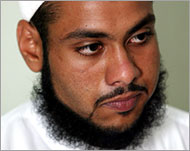Students ask to stay on in Pakistan
Foreigners studying at Islamic schools in Pakistan have urged President Pervez Musharraf to let them complete their education, after he vowed to expel 1400 international students in an effort to stop the schools from being used to spread extremism.

President Musharraf, on Friday, had announced his controversial decision to expel all foreign students from the country’s Islamic schools, or madrassas. Under immigration law, the expelled students would have to leave the country.
A group of foreign students, on Saturday, denounced terrorism and said they had come to Pakistan to receive an Islamic education.
“I am a British national and came here in 2004 to get knowledge about Islam,” said Abdul Samad, 24, a student at Jamia Banoria, one of the main madrassas in Pakistan’s largest city, Karachi.
“If Pakistan asked me to leave, I will obey,” he said, but added that such a move would deprive a large number of foreigners from obtaining greater knowledge about Islam.
‘Message of peace’
Abdul Samad, who opted for a six-year course, said as a Muslim he cannot support terrorism. “We are peace-loving people. Let us complete our education and spread a message of peace in the world.”
 |
|
Afzal Shaikh of New York is in |
Afzal Shaikh, 22, of New York, too, said sending people back with no valid reason was wrong.
“Here in Pakistan, you can symbolise and study Islam. It is a place in the world where we can come and study (Islam). You don’t find this kind of opportunity everywhere in the world,” he said, adding Musharraf should review his decision.
However, Shaikh, who arrived in 2004 for a six-year course, said he would return home if the government cancelled his visa.
Private donors
There are about 1400 Muslims, most from Arab and African countries and some from Britain and United States, among the roughly one million students in Pakistan’s 10,000-12,000 madrassas, an Interior Ministry official said on condition of anonymity, because he is not authorised to speak to the media.
 |
|
A student in Islamabad shows his |
Most of Pakistan’s madrassas are funded by private donations or religious political parties. A few are thought to also receive money from Islamic countries such as Saudi Arabia, Iran and Libya, but the schools rarely acknowledge such foreign assistance.
On Friday, Musharraf said at a news conference that all foreign students studying at madrassas would be expelled and that no new visas would be issued to those wishing to come to Pakistan for Islamic education.
“This process will start very soon,” Interior Minister Aftab Khan Sherpao said on Saturday. He said the president had taken the measure to address concerns of countries who say their young people indulge in militancy while studying at Pakistan’s madrassas.
Criticism
Musharraf’s decision drew fire from Maulana Wali Khan, a spokesman for Wafaq-ul-Madaris, a body that controls about 10,000 madrassas.
“We knew that he would take this step to appease America and other Western nations,” Khan said.
 |
|
Students protest against madrassa |
Another leader of Wafaq-ul-Madaris, Hanif Jalandhri, said only 200-300 foreign students were studying at madrassas.
“These students should be given time to complete their education,” he said.
On Saturday, Mohammed Naeem, an administrator at Jamia Banoria, one of the main madrassas in Karachi, said he had read Musharraf’s statement but had not received any formal order.
“I think the government should not treat foreign students as criminals,” he said.